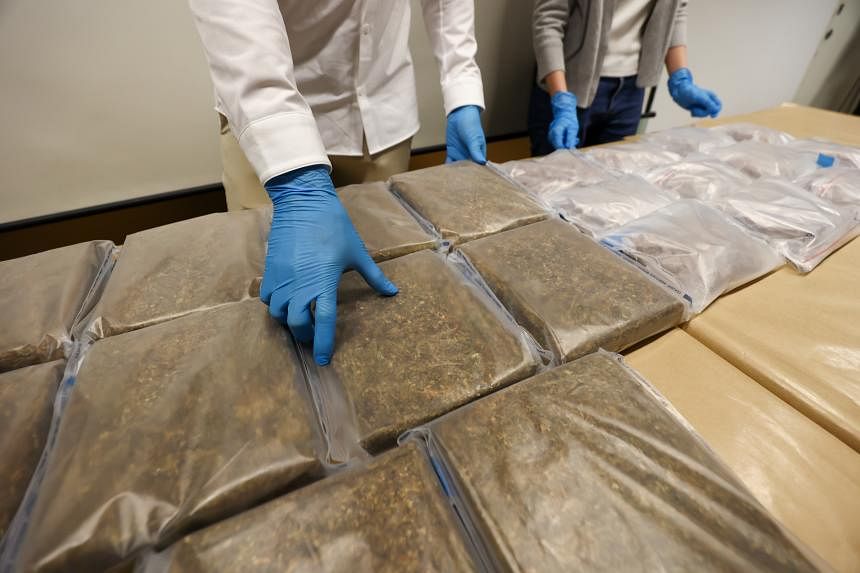SINGAPORE - Laws to tackle the menace of new psychoactive substances (NPS) will be tightened in the coming months, reflecting Singapore’s uncompromising stance against drug trafficking.
Minister for Communications and Information Josephine Teo said on Saturday the Ministry of Home Affairs (MHA) will propose that the Central Narcotics Bureau (CNB) be allowed to take action based on the psychoactive effects of a substance, even if the substance itself has not yet been scheduled under the Misuse of Drugs Act (MDA).
Speaking at an MHA’s minister’s appreciation lunch at HomeTeamNS Khatib, Mrs Teo, who is also Second Minister for Home Affairs, said: “In the next few months, we will tighten the laws to allow us to deal more effectively with new psychoactive substances.
“Because the NPS are easy to manufacture in drug labs that are not difficult to set up, we find it a challenge to keep up with all the stuff that is coming into the market,” she said.
“The substance can change, but the effects can be described, and so even if the substance has not yet been scheduled under our Misuse of Drugs Act, this will allow CNB to be more responsive.”
In June, 13 new NPS were added to the MDA and listed as Class A drugs, making it an offence to traffic, manufacture, import, export, possess or consume them.
According to the CNB, the abuse of NPS, like Mushroom and Spice, has been linked to physical and psychological reactions such as paranoia, hallucinations, seizures and death.
Mrs Teo said the Government will remain steadfast in its tough approach against drug trafficking, including the use of the death penalty. She noted that arguments stating the death penalty is a failed deterrent due to the continued trafficking of drugs into Singapore are “disingenuous” and “illogical”.
Mrs Teo said there is “incontrovertible evidence” that the death penalty is an effective deterrent against drug trafficking.
“When we interviewed convicted drug traffickers and analysed their operations, it shows clearly that the death penalty has featured in their calculations, and has significantly reduced the amount of drugs trafficked into Singapore.”
She added: “Surveys also show that a large majority of people living in our surrounding region agree that the death penalty has a deterrent effect.”
In October, British billionaire Richard Branson criticised the use of the death penalty to deter drug trafficking in Singapore in a blog post.
Mrs Teo urged the Home Team to help Singaporeans be more aware of the dangers of drugs, including cannabis, and to help counter the misleading propaganda that recreational use is harmless. “On our part, the Government will not waver in our tough approach against drug trafficking, including our use of the death penalty,” she said.
Responding to calls for Singapore to relax laws regulating cannabis, following Thailand’s move to remove it from its list of illegal narcotic drugs, she said while there is some research that shows the potential uses of cannabinoids – a substance extracted from the cannabis plant – in managing medical conditions such as seizures and epilepsy, there was no scientific evidence as to the effectiveness of raw cannabis in doing the same.
“Studies have shown that cannabis consumption is linked to brain damage and serious mental illness,” she noted.
Mrs Teo cited the case of the American passenger who falsely claimed to have a bomb in his carry-on bag onboard a Singapore Airlines flight from San Francisco to Singapore, and then assaulted a cabin crew member.
His urine tested positive for cannabis, said Mrs Teo.
“The experience of other countries shows clearly that a permissive attitude towards drugs exacts a high cost on society.
“Our approach in Singapore has made a difference. It has saved tens of thousands of lives, and protected families from harm,” she said.
“Singaporeans understand this, and they support us.”
Mrs Teo also spoke about other areas of priority for the Home Team, including the threat of scams, online criminal content and foreign interference.
She noted that scams are “unintended consequences of digitalisation”, but needs to be fought in order to succeed in becoming a smart nation.
She said criminal content, such as the dissemination of voyeuristic or non-consensual intimate images, going online and reaching even wider audiences was another threat to contend with.
“We are therefore considering introducing legislation that will empower the Government to require the removal of such content from the view of Singapore users,” said Mrs Teo.
“We are also going to make a concerted push for online platforms to take greater responsibility for reducing public exposure to criminal content.”

On the threat of foreign interference, Mrs Teo noted that while Singapore “enjoys warm diplomatic relations with many countries”, it remains important for Singaporeans to examine the reliability of any information received, and to be discerning when spreading information.
The annual Minister’s Appreciation Lunch returned this year after a two-year hiatus due to the Covid-19 pandemic. The event is held to show appreciation to members of the Home Team Boards, Councils and Committees for their contributions and service. Long Service Awards were also given out to 41 individuals members on Saturday.


